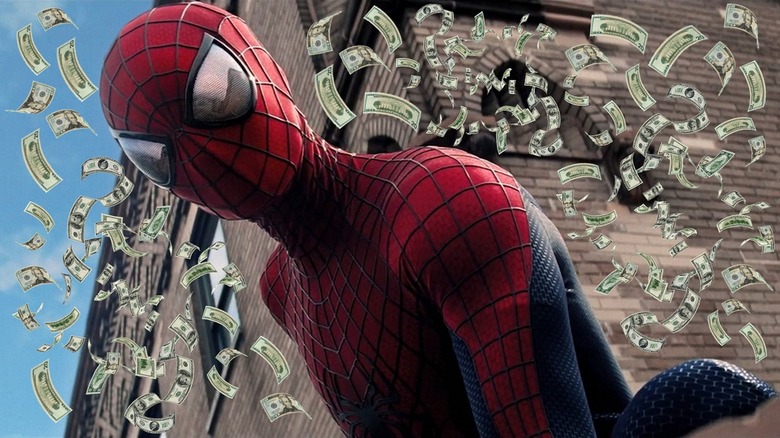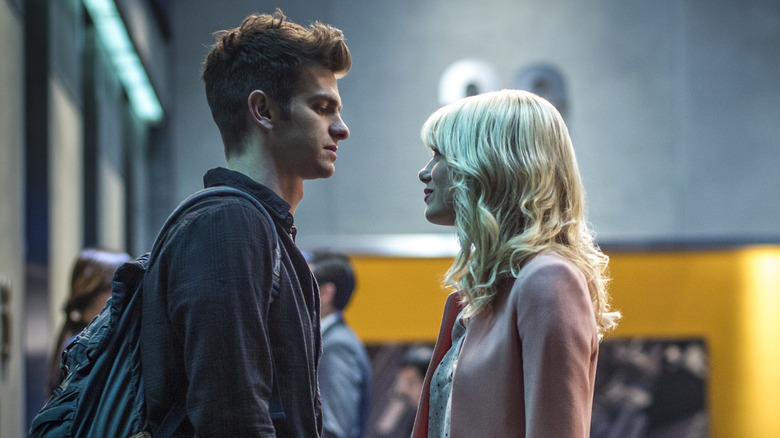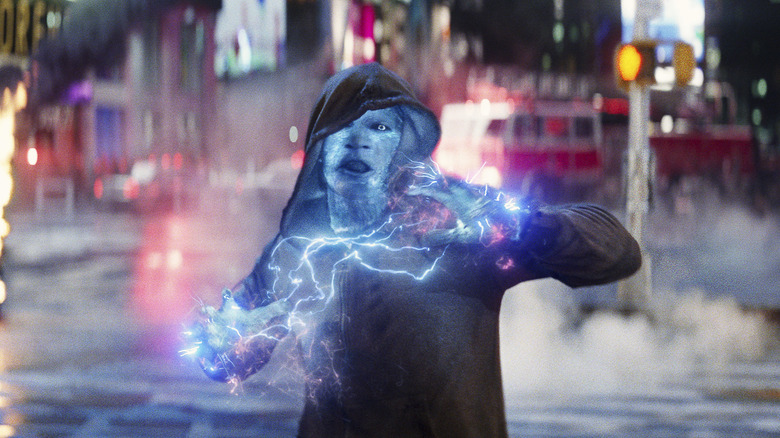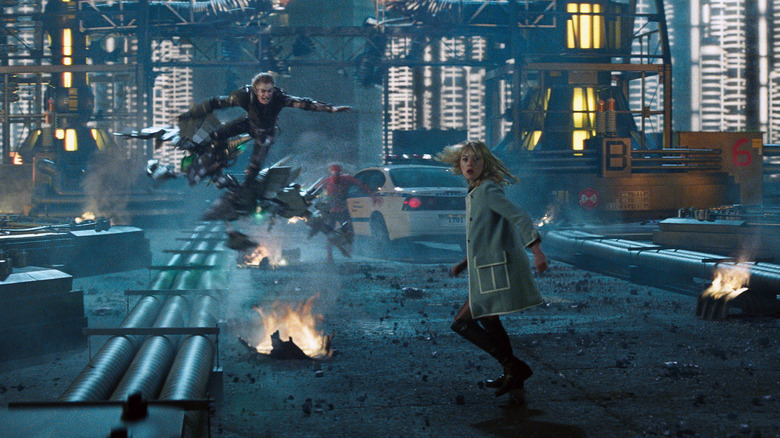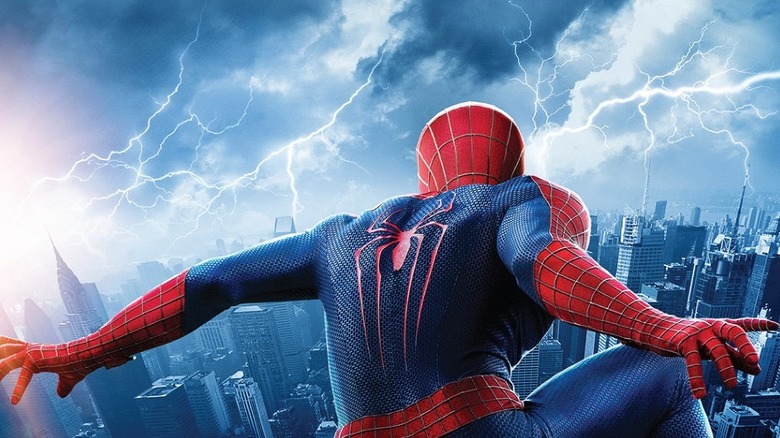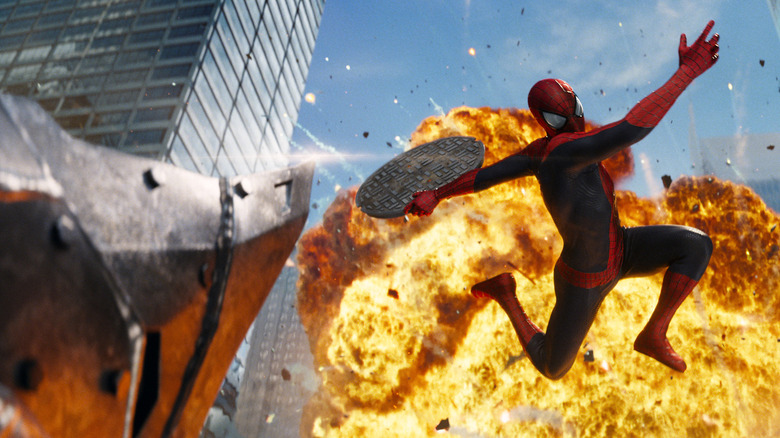The Amazing Spider-Man 2 Was A Franchise-Killing Box Office Success
(Welcome to Tales from the Box Office, our column that examines box office miracles, disasters, and everything in between, as well as what we can learn from them.)
"We do very much have the ambition about creating a bigger universe around Spider-Man." These were the words uttered by former Sony Pictures Entertainment chief Michael Lynton after an investor meeting in November 2013. Those words would become the undoing of the franchise solely under Sony's stewardship, with 2014's "The Amazing Spider-Man 2" serving as the nail in the coffin. With the benefit of hindsight, we might be looking at the most outright financially successful franchise-killer in cinema history.
The Andrew Garfield-led "Spider-Man" films remain a tragic mixed bag. There are those who adore Garfield as Marvel's famed webslinger. There are many others who can't get past the messy direction the films themselves wandered down — particularly this sequel we're talking about today. Whatever one's feelings, what remains as true now as it was ten years ago is that this film fell victim to larger corporate ambitions as the superhero movie bubble was reaching its cultural apex. Sony wanted more, and Spidey had to give them more. Mere success was no longer enough to satiate the powers that be.
In this week's Tales from the Box Office, in honor of the film's tenth anniversary, we're looking back at "The Amazing Spider-Man 2." We'll go over how quickly Sony got to work on the sequel, the studio's desire to make the "Spider-Man" franchise into an entire cinematic universe, how those plans impacted this movie's ability to exist on its own terms, what happened after it hit theaters, and what lessons we can learn from it a decade removed. Let's dig in, shall we?
The movie: The Amazing Spider-Man 2
Dating back to 2002's "Spider-Man" directed by Sam Raimi, Sony had been relying on this franchise as an anchor to help deliver big winners at the box office. Things changed when Raimi's version of "Spider-Man 4" fell apart, despite being pretty far along in development. So Sony decided to go with a reboot to keep the train on the tracks, casting the up-and-coming Garfield as a new Peter Parker in a film titled "The Amazing Spider-Man” directed by Marc Webb, who was known best for his feature film debut "(500) Days of Summer."
The film was a success (though a smaller one than Raimi's films), taking in $758 million worldwide against a whopping $210 million budget. Sony was quick to get screenwriter James Vanderbilt to work on a sequel even before Garfield's origin story hit theaters in 2012. The studio was not willing to wait another five years between installments with its cash cow franchise. Roberto Orci and Alex Kurtzman were brought in to rewrite the script, which was a sign that things were rapidly evolving behind the scenes. Speaking with Collider in 2012, Webb tried to explain his approach to this new "Spider-Man" universe:
"I wanted to create a universe that works in and of itself for one movie, but I wanted to create a universe that not only can withstand but anticipate future storylines. Movies like this tend to have sequels, [although] ultimately the audience will tell us if they want one. But I kind of thought it was an interesting thing to anticipate those storylines and think about the back stories and how we can parlay those into an ongoing story."
Looking back, that sounds like a very long-winded way of saying that Sony was planning a whole lot more beyond "The Amazing Spider-Man 2," it's just that they didn't have those plans fully ironed out yet. To that end, the studio announced release dates for "The Amazing Spider-Man 3" and "The Amazing Spider-Man 4" in June 2013. They were unbelievably bullish on the prospects of this iteration of the franchise.
Sony wanted Spider-Man to be more than just Spider-Man
Before any of that could happen, Webb had a sequel to make and a summer 2014 release date to hit. The train had to keep moving. Aside from Garfield, Emma Stone was set to return as Gwen Stacy. The follow-up would also feature more villains, including Jamie Foxx as Electro, Dane DeHaan as Harry Osborn, Paul Giamatti (briefly) as Rhino, and even Felicity Jones as "Felicia," clearly intended to be Felicia Hardy, aka Black Cat. Again, lots of pieces were put on the board to be used in a future that would never come.
The film's story meandered, with Electro serving as the main villain and DeHaan becoming Green Goblin in the third act as well. There was clear intent to set up a planned "Sinister Six" spin-off movie to be directed by Drew Goddard, which Sony developed for years before eventually scrapping. The movie adapted some cherished Marvel Comics source material in the form of "The Night Gwen Stacy Died." And yes, it did indeed kill Gwen. Even that seemed like it was teeing up the future as Shailene Woodley filmed several scenes as Mary Jane Watson that ended up on the cutting room floor.
As this movie was coming together, it's important to point out that Disney's Marvel Cinematic Universe was seeing unbelievable levels of success pretty much every time a new entry hit theaters. "The Avengers" made more than $1.5 billion in 2012. "Iron Man 3" made $1.2 billion in 2013. The feeling was that Sony needed a cinematic universe, but all they had was Spider-Man and his rogues gallery. That would have to do. In February 2014, several months before this movie's release, "Spider-Man" franchise producer Amy Pascal hinted at Sony's much larger plans:
"We are expanding the 'Spider-Man' universe into 'The Sinister Six' and 'Venom,' so that we have 'Spider-Man' movies every year."
Fair or not, Webb's movie was having to shoulder the weight of being, in some ways, a bigger launchpad for a cinematic universe. That complicated matters significantly.
The Amazing Spider-Man 2's financial journey
"The Amazing Spider-Man 2" hit theaters on May 2, 2014, helping to kick off that year's summer movie season. Unfortunately, it entered the marketplace with a hefty 141-minute running time and mixed reviews. Be that as it may, Spidey was still arguably the most popular superhero on the planet, and superhero movies were having their too-big-to-fail moment at that time. The mixed critical response and muddled story that was trying to do way too much didn't really matter as far as the box office was concerned.
Webb's second "Spider-Man" film opened to $91.7 million domestically, far higher than the previous entry in the franchise, which debuted to just $62 million two years earlier. Sony had the benefit of no direct competition that weekend, but unfortunately, word of mouth caught up with it pretty quickly as the film fell 61% in its second weekend for a $35.5 million haul, losing the top spot to Universal's comedy "Neighbors." When "Godzilla" arrived the following weekend, most of the blockbuster oxygen in the room was being sucked up by other films, and that would be the case for the rest of the summer.
It was a good news/bad news situation for Sony. The bad news is that "TASM2" topped out at just $202.8 million domestically, far less than Garfield's first film, which brought in $262 million in North America. The good news is that Spider-Man was still wildly popular overseas, so the film brought in $506.1 million internationally, bringing its global total to $708.9 million. Even against a budget north of $200 million, that represented a win for the studio. At least it would have, if the movie had been allowed to exist on its own terms. But that simply wasn't the case for superhero movies in 2014. That number, coupled with the mixed response, couldn't possibly carry the weight of the studio's larger plans.
The amazing fallout from The Amazing Spider-Man 2
In 2014, Sony had to look on as "Captain America: The Winter Soldier" ($714.4 million), "X-Men: Days of Future Past" ($746 million), and "Guardians of the Galaxy" ($772.7 million) all outgrossed "The Amazing Spider-Man 2" at the global box office. The unexpected success of "Guardians," in particular, spoke to what Marvel Studios had managed to build.
Things got bad for Sony in November 2014 when the company suffered a now-infamous, massive email hack that leaked mass amounts of internal messages to the public. Contained within these messages were quite a few conversations about plans for the "Spider-Man" franchise that included an animated comedy from producers Phil Lord and Chris Miller, which eventually became the very successful "Spider-Man: Into the Spider-Verse." While the "animated Spider-Man comedy" angle seemed desperate at the time, this actually panned out for the better. Everything else contained in those emails? Not so much.
Even though they were never intended to be made public, the information in those emails revealed just how much Sony was throwing s*** at the wall in regards to the "Spider-Man" franchise to see what would stick. Aside from the "Sinister Six" movie, there were talks of a team-up film involving female characters from the "Spider-Man" comics. That idea hung around long enough to give us this year's massive flop "Madame Web." Most perplexing of all, there were even rumors of an Aunt May solo movie of some kind. (Yes, really.)
Sony wanted this franchise to become a full-on universe, they just didn't know how to get there. Movies like 2018's "Venom" eventually did happen, and yes, that movie was a huge success, taking in $856 million worldwide against terrible reviews and spawning a sequel, with "Venom 3" on the way this year. But that was just about the only part of the studio's live-action plans that eventually came to fruition and panned out.
Spider-Man joined the MCU instead
The backlash to some of these plans after they were made public, coupled with the fact that "The Amazing Spider-Man 2" made less than its predecessor against questionable reviews, left Sony with much to consider. Rumors began swirling that "The Amazing Spider-Man 3" was going to be delayed as things got sorted out behind the scenes. It turns out, something much larger was happening.
Marvel Studios head Kevin Feige met with Amy Pascal to discuss the "Spider-Man" franchise. After an initial meeting in which Pascal threw a sandwich at Feige, the two came back together for a much more productive meeting. Here's how Pascal explained it in a 2021 interview:
"Kevin called me and came over to the house and said, 'I have an idea. What if Tony Stark makes Peter's suit?' And as soon as he said that, I understood the possibilities of what we could do together. To have Iron Man and Spidey in the same world, one rooted more in technological innovation — the new suit — and less in medical experimentation, which is where we were confined before, felt so much more modern."
On February 9, 2015, it was confirmed that Marvel Studios had partnered with Sony on a new "Spider-Man" movie, with Peter Parker set to join the MCU. This meant that Andrew Garfield was out, paving the way for Tom Holland to take over the role. The franchise would once again be rebooted, but this time within the confines of a well-oiled machine — one that would allow for Spidey to pal around with The Avengers on screen.
Obviously, that has panned out incredibly well. Holland's "Spider-Man" trilogy has pulled in more than $3.9 billion at the box office, including 2021's record-shattering "Spider-Man: No Way Home," which became one of the highest-grossing movies in history, earning $1.9 billion. That movie also allowed Garfield to suit up once more for a little bit of redemption after being ousted from the role. Even though Sony had to split some of the profits with Disney, things were on track both critically and commercially for the first time in a long time.
Lessons learned from The Amazing Spider-Man 2
Sony still controls the "Spider-Man" franchise and has tried to make the most of it in the years since. Aside from the disaster that was "Madame Web," they released the also-disastrous "Morbius" in 2022. Another spin-off, "Kraven the Hunter," is due to hit theaters later this year. For better or worse, the studio still believes B-tier characters loosely connected to Spider-Man can justify movies, even if those movies don't have Spider-Man in them.
"The Amazing Spider-Man 2" suffered from too many villains and a lack of focus, the same problems that plagued Raimi's "Spider-Man 3." Be that as it may, the film was a financial success. It is downright odd that a movie that made more than $700 million globally — more than three times its reported production budget — managed to straight-up kill a franchise. Yet, that's exactly what happened. It speaks more about the superhero gold rush that was going on at the time than it does anything else. Disney controls Marvel and Warner Bros. controls DC. Sony didn't have a whole comic book stable to work with, but they had "Spider-Man," and they wanted that single franchise to support an expansive universe.
It's the same "cart before the horse" mentality that doomed the DCEU by letting Zack Snyder go all-in on "Justice League" before "Batman v Superman: Dawn of Justice" even hit theaters. It's the same mentality that killed Universal's Dark Universe. It's the same reason that most of Sony's plans, save for "Spider-Verse" and "Venom," have flamed out. It's the same story over and over again.
As superhero movies seem to fall out of favor with the general public — or at least are no longer guaranteed home runs like they were in 2014 — this cart/horse mentality must be stopped. Come what may in the future with the "Spider-Man" franchise, Sony would probably do well to take it one thing at a time, lest they wish to find themselves in a situation where an otherwise-successful movie once again kills a whole-ass universe by almost no fault of its own.
